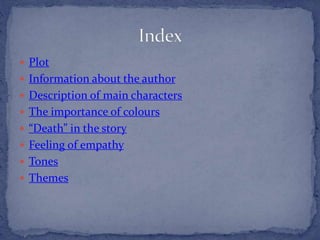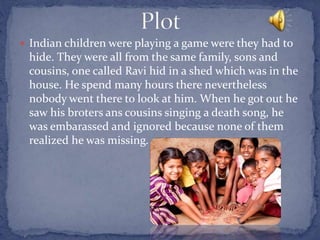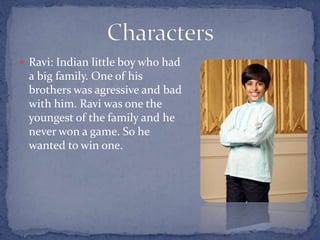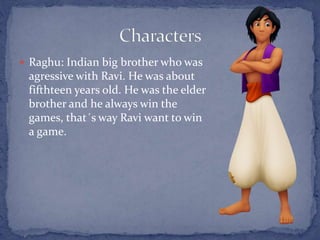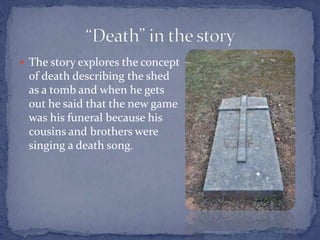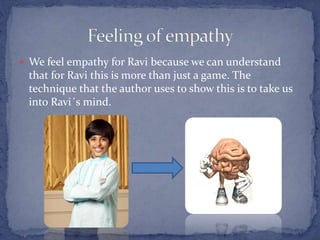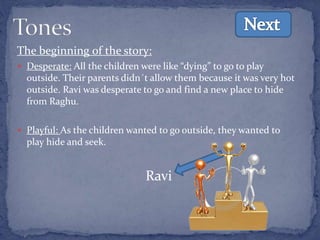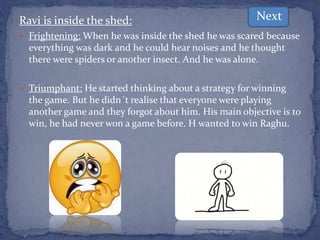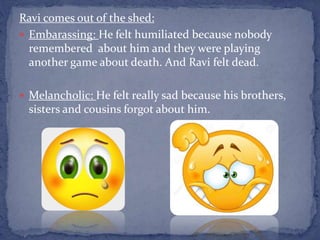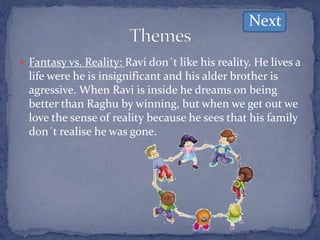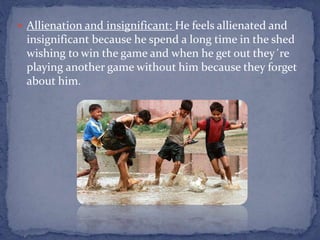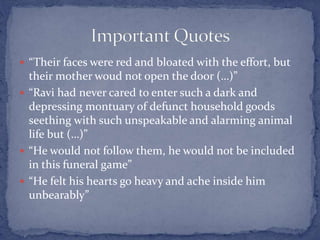Games at twilight
- 1. Catalina Viola and Lola Louro
- 2.  Plot  Information about the author  Description of main characters  The importance of colours  “Death” in the story  Feeling of empathy  Tones  Themes
- 3. ď‚— Indian children were playing a game were they had to hide. They were all from the same family, sons and cousins, one called Ravi hid in a shed which was in the house. He spend many hours there nevertheless nobody went there to look at him. When he got out he saw his broters ans cousins singing a death song, he was embarassed and ignored because none of them realized he was missing.
- 4. ď‚— Anita Mazumdar Desai was born on the 26th of june of 1937, is an Indian novelist and the Emerita John E. Burchard Professor of Humanities at the Massachusetts Institute of Technology. As a writer she has been shortlisted for the Booker Prize three times; she received a Sahitya Academy Award in 1978 for her novel Fire on the Mountain, from the Sahitya Academy, India's National Academy of Letters. She also won the British Guardian Prize for The Village by the Sea.
- 5. ď‚— Ravi: Indian little boy who had a big family. One of his brothers was agressive and bad with him. Ravi was one the youngest of the family and he never won a game. So he wanted to win one.
- 6.  Raghu: Indian big brother who was agressive with Ravi. He was about fifthteen years old. He was the elder brother and he always win the games, that´s way Ravi want to win a game.
- 7.  The colours create a mood. The setting wouldn´t be describe without colours, where the colours play an important role because they transmit how hot the place was. Colours also make the story more interesting.
- 8. ď‚— The story explores the concept of death describing the shed as a tomb and when he gets out he said that the new game was his funeral because his cousins and brothers were singing a death song.
- 9.  We feel empathy for Ravi because we can understand that for Ravi this is more than just a game. The technique that the author uses to show this is to take us into Ravi´s mind.
- 10. The beginning of the story:  Desperate: All the children were like “dying” to go to play outside. Their parents didn´t allow them because it was very hot outside. Ravi was desperate to go and find a new place to hide from Raghu.  Playful: As the children wanted to go outside, they wanted to play hide and seek. Ravi
- 11. Ravi is inside the shed:  Frightening: When he was inside the shed he was scared because everything was dark and he could hear noises and he thought there were spiders or another insect. And he was alone.  Triumphant: He started thinking about a strategy for winning the game. But he didn´t realise that everyone were playing another game and they forgot about him. His main objective is to win, he had never won a game before. H wanted to win Raghu. Next
- 12. Ravi comes out of the shed: ď‚— Embarassing: He felt humiliated because nobody remembered about him and they were playing another game about death. And Ravi felt dead. ď‚— Melancholic: He felt really sad because his brothers, sisters and cousins forgot about him.
- 13.  Fantasy vs. Reality: Ravi don´t like his reality. He lives a life were he is insignificant and his alder brother is agressive. When Ravi is inside he dreams on being better than Raghu by winning, but when we get out we love the sense of reality because he sees that his family don´t realise he was gone. Next
- 14.  Allienation and insignificant: He feels allienated and insignificant because he spend a long time in the shed wishing to win the game and when he get out they´re playing another game without him because they forget about him.
- 15.  “Their faces were red and bloated with the effort, but their mother woud not open the door (…)”  “Ravi had never cared to enter such a dark and depressing montuary of defunct household goods seething with such unspeakable and alarming animal life but (…)”  “He would not follow them, he would not be included in this funeral game”  “He felt his hearts go heavy and ache inside him unbearably”

